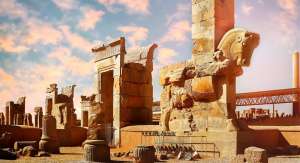The Middle East is a geographical region that has been of great importance in history since ancient times. Strategically located, it is a natural land bridge connecting the continents of Asia, Africa, and Europe. It was the site of some of the world's earliest civilizations and the birthplace of three great religions--Judaism, Christianity, and Islam. In recent times its enormous deposits of oil have made the Middle East more important than ever.
Defining the Middle East. There has never been agreement on a definition of the Middle East. Historically, the region includes the lands that were formerly part of the Ottoman (Turkish) Empire plus Persia (modern Iran), an ancient empire in its own right. Thus, the area occupied by the modern-day nations that emerged from the breakup of the Ottoman Empire, together with Iran, would come close to what we generally mean by the Middle East. An earlier term, the Near East, was at one time in common use. It usually referred to lands in the Balkan Peninsula of southeastern Europe that were also once under Ottoman rule, in addition to territory now considered part of the Middle East.
In this article, we take a look at typical practical considerations people have and dispel some common myths.
Dress code
There are many misconceptions about dress code within the Middle East. It is a region bound by tradition and religion. The locals certainly wear traditional attire, although the extent to which they do so is dependent on their own personal preference. However, Western expats do not have to follow suit (the only exception to this is in Saudi Arabia). In Dubai, for example, Western dress code is very much the norm.
However, it is sensible to dress more conservatively during sensitive religious holidays / festivals (e.g. Ramadan) out of respect for the local custom.
Life in the main expat hubs in the Middle East is actually very similar to any other Western city
5 Things To Know Before Moving To The Middle East
Alcohol consumption
Although many Arab countries have somewhat strict regulations on the sale and consumption of alcohol, that doesn't mean it isn't widely consumed throughout the region. You can drink alcohol in all countries in the Middle East apart from Saudi Arabia and Kuwait. You require an alcohol license to drink from home, which is easily obtained once you have a residence visa.
Day-to-day living costs
Food shopping bills are typically 15% more than in the UK. The same applies to alcohol. However, petrol/gasoline is extremely cheap (typically equivalent to around 15p a litre).
Life in the middle east: What's it REALLY like?
Schools in the Middle East
The education system in the region is divided into public schools, private schools and higher education. It is generally of a high quality and is fee paying. There are often waiting lists for some of the best schools so you’ll need to look into this in advance. However, many more new schools are being built to provide further capacity for the ever growing expat community.
Can women work and drive in the Middle East?
With the exception of Saudi Arabia (where employment for women spouses is difficult), life in the main expat hubs in the Middle East is actually very similar to any other Western city in this respect. Women can work and drive as normal and should adopt a common sense approach to dress for a hot country (most will wear bikinis on the beach for example).
Tax-free salaries are no doubt the biggest incentive for expats, with most employers offering packages which also include an accommodation allowance, health insurance, school fees, and a return flight home every year.








